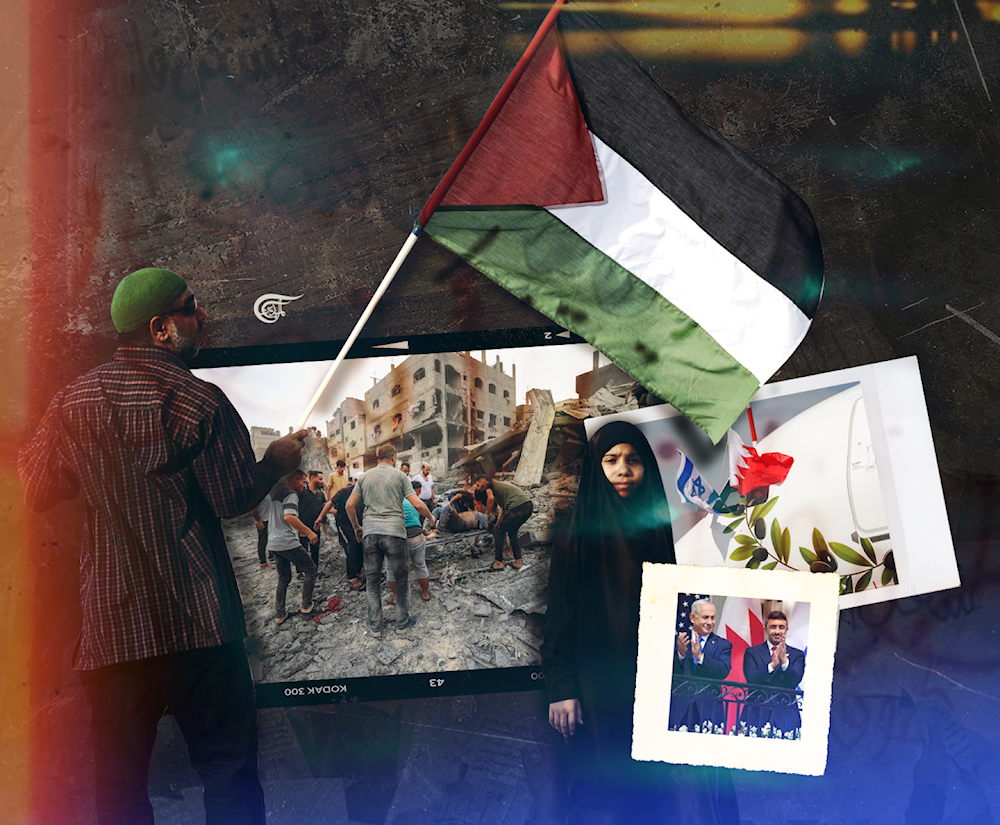13 years after 'Bahrain Forgotten Uprising': Bahrainis are resisting to their best
The national unity demanding the expulsion of the Israeli ambassador and the cessation of the notorious normalization ties is a sign of the positive dramatic change imposed by Operation Al-Aqsa Flood.
-

Manama’s cautious rhetoric is not based on principle or moral grounds (Illustrated by Zeinab al-Hajj; Al Mayadeen English)
Ever since Yemen joined the confrontation against the temporary occupying entity - backed by the US and the UK - in the Red Sea, the pace of anxiety has escalated, especially in Bahrain, whose regime has unilaterally decided to join the so-called Prosperity Guardian, which was established on December 18, 2023, while the repressive measures against the majority of the Bahrainis – who oppose normalization – are on the rise day by day.
Although the UAE has not been named in this disgraceful coalition; however, its hidden participation in favor of the occupation is something that was successively leaked by the American and Israeli newspapers since the beginning of Operation Al-Aqsa Flood, such as exchanging information or using the Gulf territories to carry out attacks against alleged targets related to the factions of the Axis of Resistance. Therefore, Operation Prosperity Guardian has escalated the fever of the security and military dilemmas in the entire West Asia region, and not in Bahrain alone.
Nevertheless, Bahrain’s case seems more complicated than that of the UAE, as Manama hosts the US Fifth Fleet, which is carrying out hostile actions against the Yemenis - in particular - and against the Axis of Resistance’s peoples - in general - in addition to the fact that Bahrain’s regime would definitely fail to deal with any repercussions that the ongoing war may impose - even if they are limited - due to the extra-crises that have propagated since February 2011.
While countries such as Italy and Spain disavowed the so-called Prosperity Guardian coalition, noting that they are more powerful and stable than the Al Khalifa regime, the latter has overlooked the threats of Ansar Allah, because the hostile strikes it was involved in during the aggression against Yemen since 2015 has made it - this time - more cautious about declaring its current complicity.
Roughly 4 months after the Zionist-American genocidal war, the angry global marches that took place in solidarity with Gaza have not stopped. This indeed reflects the harmony of the humanitarian sense with the oppression of the Palestinians and how the hostile Western propaganda failed to deliberately obscure the irrefutable facts, which makes it difficult for the sheikhdoms of the Gulf to openly align with the enemies of the nation, especially with regard to their involvement - direct or semi-direct - in the brutal aggression.
Manama’s cautious rhetoric is not based on principle or moral grounds as much as it is a clear fear of overwhelming popular anger, especially since Bahrainis are among the first Arab peoples to mobilize their political and popular forces to support the Palestinian cause since 1948. Hence, the longer the days of the war on Gaza last, the stronger and more influential the political and social earthquake in the country will be, especially since there is a remarkable Sunni-Shiite consensus on the legitimacy of the Palestinian plight.
It is noteworthy that since October 7, the Manama regime has arrested hundreds of citizens - only - for condemning the atrocious war on Gaza.
Although there is criticism directed at the Bahraini people and a number of Arab peoples for not rising against their rulers, the interaction in Bahrain, in comparison to the harshness of the security grip and the dark police sense, is still the most prominent. What is interesting is that the Manama regime is not threatened by Ansar Allah or the Axis of Resistance. Thus, its current policies reflect its complete separation from the people. Moreover, this national unity demanding the expulsion of the Israeli ambassador and the cessation of the notorious normalization ties is a sign of the positive dramatic change imposed by Operation Al-Aqsa Flood.
On its part, Riyadh has - allegedly - distanced itself from engaging in the coalition, even if this required resorting to other Yemenis to condemn Ansar Allah. However, Bahrain’s membership in the disgraceful coalition means that Riyadh is an actual participant in the coalition.
Meanwhile, the current war against Gaza, the West Bank, southern Lebanon, Syria, Iraq, and Yemen is already expanding, and it is worth remembering that most of the wars that Washington created or fueled in the region were not expected or were not expected to reach that extent of time, casualties and demolition that they have reached. This prompts us to say that Bahrain’s policy means that the Bahrainis may - God forbid - suffer their share of aggression without warning, in a region for which Western arrogance absolutely seeks neither stability nor independence.

 Sondoss Al Asaad
Sondoss Al Asaad
 5 Min Read
5 Min Read










